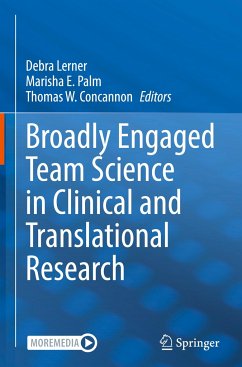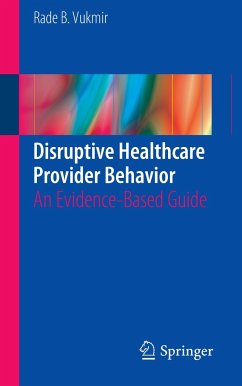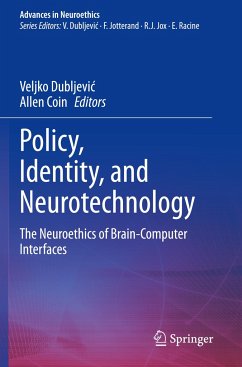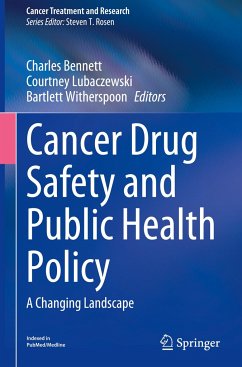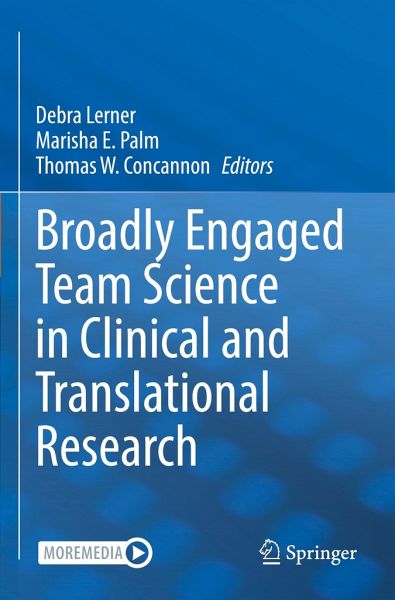
Broadly Engaged Team Science in Clinical and Translational Research
Versandkostenfrei!
Versandfertig in 6-10 Tagen
38,99 €
inkl. MwSt.

PAYBACK Punkte
19 °P sammeln!
Despite the large U.S. investment in health science, and the vast and growing body of peer-reviewed research findings it has produced, a compelling body of evidence suggests that research too often has been slow, inefficient, and fallen short of desired impacts on health. A key question is how research might be changed to be more innovative, less wasteful, and more responsive to unmet health needs.One emerging response within clinical and translational science is to advance an approach that attempts to close the gap between research scientists and key stakeholders; the individuals and groups r...
Despite the large U.S. investment in health science, and the vast and growing body of peer-reviewed research findings it has produced, a compelling body of evidence suggests that research too often has been slow, inefficient, and fallen short of desired impacts on health. A key question is how research might be changed to be more innovative, less wasteful, and more responsive to unmet health needs.
One emerging response within clinical and translational science is to advance an approach that attempts to close the gap between research scientists and key stakeholders; the individuals and groups responsible for or affected by health-related decisions. Broadly engaged team science promises to support this aim by transforming the gold standard, multi-disciplinary team science, to include key stakeholders in activities across the research spectrum. These new roles and responsibilities range from generating research questions to implementing research projects,to aiding in the translation of discoveries from the laboratory to the community. A transition to broadly engaged team science reflects the idea that inclusivity and a diversity of perspectives are necessary to achieving progress in addressing complex health issues while representing a new benchmark for ethical research practice.
This is one of the first collections of papers describing how clinical and translational science researchers are defining and implementing new research practices, and the successes and challenges involved. This book represents a first and critical step towards organizing knowledge of broadly engaged team science and advancing the development of evidence-based practices. Written in an accessible style, this book is intended to highlight the breadth of broadly engaged team science within one community, motivate researchers and stakeholders to build inclusive teams, bring rigor to often informal stakeholder engagement research practices and encourage people to think more broadly about the development of scientific knowledge. It includes examples of multi-disciplinary, broadly engaged team science projects, the perspectives of academic leaders about the changes needed to encourage scientists to conduct broadly engaged team science, and a resource directory.
One emerging response within clinical and translational science is to advance an approach that attempts to close the gap between research scientists and key stakeholders; the individuals and groups responsible for or affected by health-related decisions. Broadly engaged team science promises to support this aim by transforming the gold standard, multi-disciplinary team science, to include key stakeholders in activities across the research spectrum. These new roles and responsibilities range from generating research questions to implementing research projects,to aiding in the translation of discoveries from the laboratory to the community. A transition to broadly engaged team science reflects the idea that inclusivity and a diversity of perspectives are necessary to achieving progress in addressing complex health issues while representing a new benchmark for ethical research practice.
This is one of the first collections of papers describing how clinical and translational science researchers are defining and implementing new research practices, and the successes and challenges involved. This book represents a first and critical step towards organizing knowledge of broadly engaged team science and advancing the development of evidence-based practices. Written in an accessible style, this book is intended to highlight the breadth of broadly engaged team science within one community, motivate researchers and stakeholders to build inclusive teams, bring rigor to often informal stakeholder engagement research practices and encourage people to think more broadly about the development of scientific knowledge. It includes examples of multi-disciplinary, broadly engaged team science projects, the perspectives of academic leaders about the changes needed to encourage scientists to conduct broadly engaged team science, and a resource directory.





